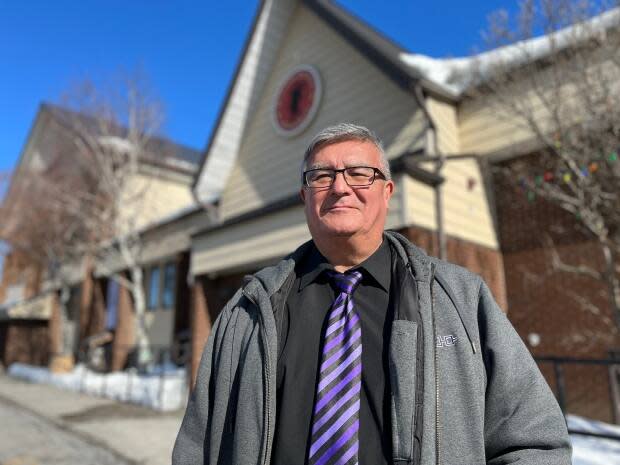Kahnawà:ke mourns 'larger-than-life' Elder Billy Two Rivers

Retired pro-wrestler, activist, and political leader Billy Kaientaronkwen Two Rivers died in Kahnawà:ke Sunday at the age of 87, his family announced on social media.
"It's a sad day for Kahnawà:ke," said community member Russell Diabo, who knew Two Rivers from their involvement in national First Nations politics.
"Billy was a larger-than-life person, a force of nature."
The Kanien'kehá:ka (Mohawk) wrestler spent 24 years in the wrestling ring between the 1950s and 1970s. He spent his last years at the Kateri Memorial Hospital Centre in Kahnawà:ke, south of Montreal. He leaves behind his wife, daughters, grandchildren and many extended family members and friends.
Two Rivers was a lacrosse player when he was introduced to wrestling and trained by Carl Donald Bell, better known by his ring name Chief Don Eagle.

After making his debut in a Detroit ring in 1953, Two Rivers went on to wrestle in Charlotte, N.C., for National Wrestling Alliance and well-known promoter Jim Crocket. He spent six years in England, where he had the opportunity to travel across Europe and North Africa. In 1966, he had another opportunity to wrestle overseas in Japan.
Everywhere he went, Two Rivers turned heads with his Mohawk haircut, leather jacket, beaded vest and regalia — viewing himself as an ambassador for all Indigenous people when he travelled.
WATCH | Billy Two Rivers meets a young fan:
"He was renowned. He was known around the world," said Kyle Zachary, public relations officer at the Kahnawà:ke Peacekeepers.
Zachary, who is also a pro-wrestler, said he's had many conversations with Two Rivers over the years, passing on tips and tricks of the industry.
"When I got into wrestling, it wasn't because it wasn't because of Billy, but Billy definitely kept me in wrestling," said Zachary.
"He told me to always give back. No matter where you go in life, no matter where you are… always come back to your community."

Two Rivers retired from wrestling in 1976, and then got into local politics, being elected as a chief at the Mohawk Council of Kahnawà:ke in 1978.
"I wrestled for 24 years and then I wrestled for 20 years in council. That was rougher wrestling than anywhere else," he told CBC News last June.
10 terms on council
The Mohawk Council of Kahnawà:ke (MCK) issued a statement Monday offering its condolences.
Two Rivers served 10 consecutive terms on council until 1998. The MCK statement said Two Rivers was the late Grand Chief Joseph Tokwiro Norton's "right-hand man" during the 1990 Oka Crisis — the 78-day standoff between Kanesatake, the Sûréte du Québec provincial police and, later, the Canadian military over a contested area of land known as the Pines northwest of Montreal.

"Billy Two Rivers was always a natural leader," said MCK spokesperson Joe Delaronde.
"It's interesting that he went right from the wrestling ring into the political ring and didn't miss a beat.... He always knew how to show Kahnawà:ke in its best light. He was a staunch defender of our positions."
WATCH | Billy Two Rivers speaks to media during the Oka Crisis:
That's something Diabo witnessed first-hand during chiefs assemblies at the Assembly of First Nations (AFN).
"He had a strong voice, was a good orator," said Diabo.
"I think he represented the community very well .... When Parliament was having hearings about what was going on, Billy was the one in Ottawa on Parliament Hill representing the community in those forums."
Following his last term as an elected leader, Two Rivers went on to work as as a political and policy advisor at MCK and with national organizations like the AFN.
Fluent Kanien'kéha speaker, actor
He was an advocate for Kanien'kéha, his first language. He served on the Kanien'kehá:ka Onkwawén:na Raotitióhkwa Language and Cultural Center's Elders Advisory Group, and up until a few years ago was a regular on Kanien'kéha talk radio shows.
In 2019, he was honoured with other first-language Kanien'kéha speakers for their contributions to the development of Kahnawà:ke's language law.
The 1999 law called for the revival and restoration of Kanien'kéha as the primary language of communication, education, ceremony, government, and business within the community.
Delaronde said Two Rivers made it a point to use the language when he was on council.
"He would talk to the non-Kanien'kéha speakers on council and speak to them first in Kanien'kéha and then kind of translate as he went along and let it be known that, hey, we should all be working toward that goal," said Delaronde.
Two Rivers acted in several movies and television shows in his later years, including Mohawk Girls, Taking Lives, and Bolt.


